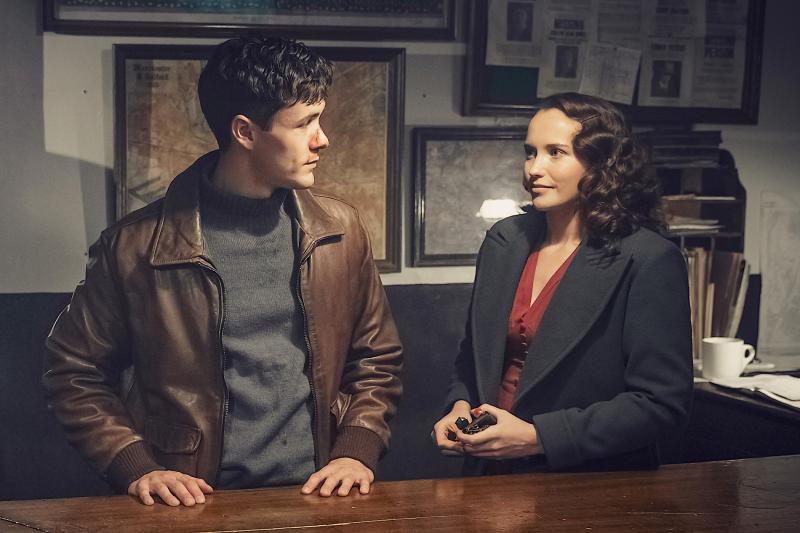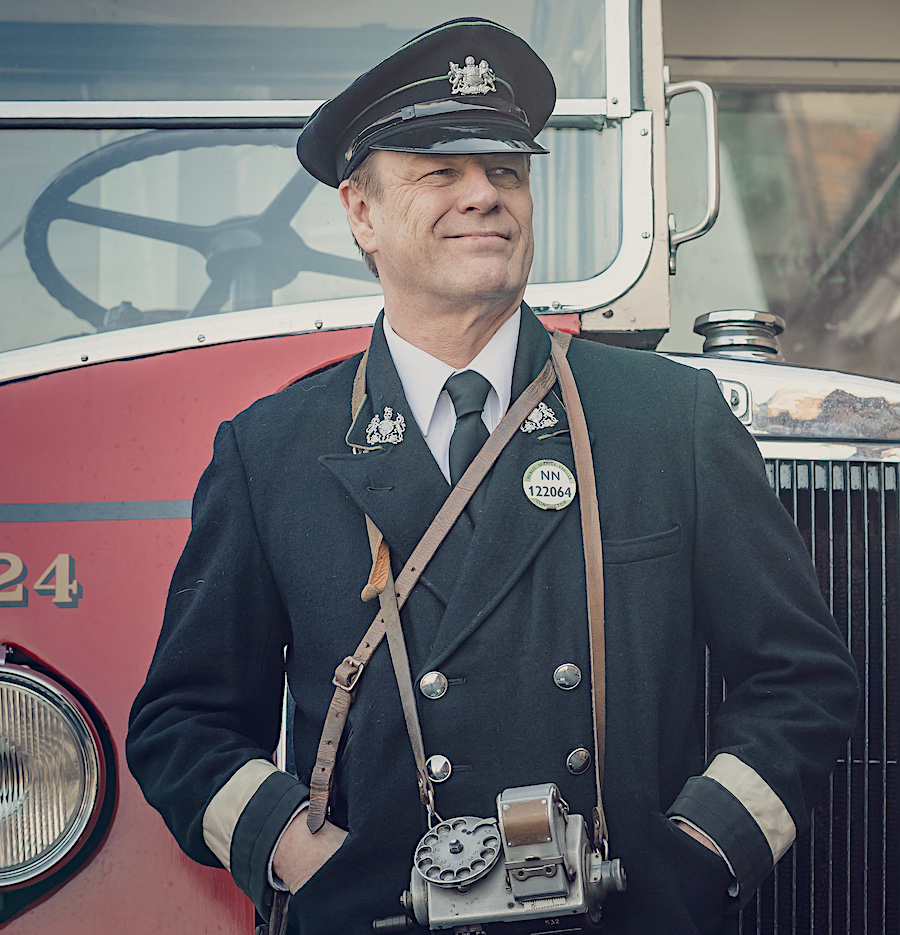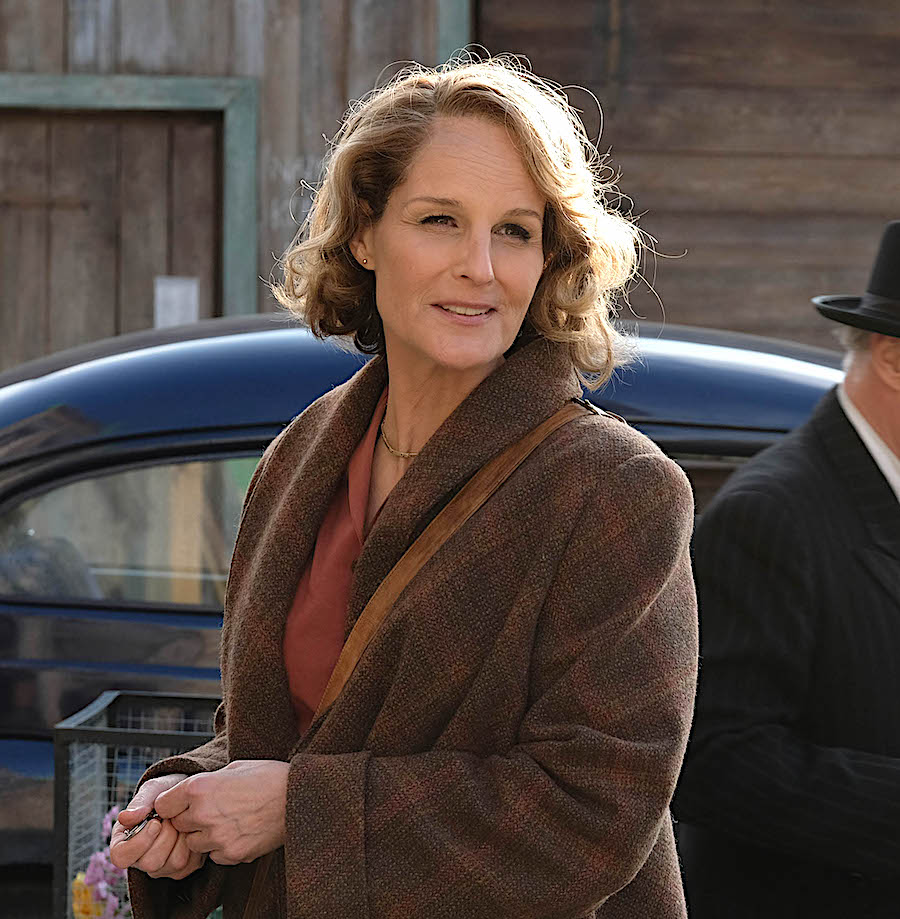World on Fire, BBC One review - more melodrama than drama | reviews, news & interviews
World on Fire, BBC One review - more melodrama than drama
World on Fire, BBC One review - more melodrama than drama
Peter Bowker's World War Two saga needs more depth and less breadth

For his new drama series for BBC One, writer Peter Bowker (The A Word, Monroe etc) has taken as his canvas no less than a panorama of Europe in 1939, just as World War Two is breaking out.
Developing all these different strands across a mere seven episodes looks like a tall order (novelists like Dumas and Tolstoy could handle challenges on this scale, but they’d allot themselves 1200 pages to do it). This opening episode included plenty of action and rapid changes of scenery, but the characterisations have a cardboard cutout quality about them, as if it’s faster and easier to give viewers a familiar stereotype than try to build complex individuals from scratch.
 Thus, we have Sean Bean (pictured right) playing Lois’s father Douglas – a Manchester bus conductor – as an almost Pythonesque caricature of working class stoicism, wearily trying to cope with his criminally-inclined son Tom (Ewan Mitchell) while doting on his daughter Lois (Julia Brown). “You’re just like yer mam y’know… the way you are, the fight in you,” he tells her rheumily. Bowker’s message is that war is hell and the less well-off suffer most, and Douglas knows this, since he suffers debilitating flashbacks to his experiences on the Western Front in the Great War. “Shellshock,” says Lois. “It’s nowt to be ashamed of.” Douglas is now a pacifist who sells Peace News outside the local factory gates, and the looming spectre of another war is filling him with dread.
Thus, we have Sean Bean (pictured right) playing Lois’s father Douglas – a Manchester bus conductor – as an almost Pythonesque caricature of working class stoicism, wearily trying to cope with his criminally-inclined son Tom (Ewan Mitchell) while doting on his daughter Lois (Julia Brown). “You’re just like yer mam y’know… the way you are, the fight in you,” he tells her rheumily. Bowker’s message is that war is hell and the less well-off suffer most, and Douglas knows this, since he suffers debilitating flashbacks to his experiences on the Western Front in the Great War. “Shellshock,” says Lois. “It’s nowt to be ashamed of.” Douglas is now a pacifist who sells Peace News outside the local factory gates, and the looming spectre of another war is filling him with dread.
We don’t yet know how Lois came to be having a romantic liaison with Harry (Jonah Hauer-King), but the episode opened with them heckling Oswald Mosley at a Blackshirt rally and being thrown into the street for their pains (in his search for “relevance”, another of Bowker’s not-very-subtle messages is that fascism is on the march again). To bang home the yawning class gulf between them, Harry’s widowed mother Robina is played by Lesley Manville as a repressed, buttoned-up ice-maiden, contemptuous of the lower orders and an enthusiastic Mosley supporter (“it’s a rare man indeed who can look that handsome in a polo neck,” she smirks). Robina is determined that the bus conductor’s daughter will not be leading her son and heir astray. “You’re a bloody snob!” Lois tells her. “I’m an elitist, certainly,” declares Robina haughtily.
 The Polish connection arose when Harry was sent to work in the British Embassy in Warsaw as a translator. Here, he soon became enamoured of waitress Kasia, but with the Germans sending their panzers into Danzig and the Luftwaffe blackening the skies over Warsaw, it was time to get the hell out. Harry likes Kasia so much that he has already married her, but this was only because Nancy the broadcaster (played by a gaunt-looking Helen Hunt, pictured above) told him that was the only way he could get Kasia out of Poland. Meanwhile, Nancy’s worried about her nephew Webster, who’s a doctor in Paris, but he’s more preoccupied by a handsome jazz saxophonist than with any prospect of German tanks on the Champs-Elysées.
The Polish connection arose when Harry was sent to work in the British Embassy in Warsaw as a translator. Here, he soon became enamoured of waitress Kasia, but with the Germans sending their panzers into Danzig and the Luftwaffe blackening the skies over Warsaw, it was time to get the hell out. Harry likes Kasia so much that he has already married her, but this was only because Nancy the broadcaster (played by a gaunt-looking Helen Hunt, pictured above) told him that was the only way he could get Kasia out of Poland. Meanwhile, Nancy’s worried about her nephew Webster, who’s a doctor in Paris, but he’s more preoccupied by a handsome jazz saxophonist than with any prospect of German tanks on the Champs-Elysées.
At least World on Fire goes by so fast that it’s difficult to get bored, but it’s more melodrama than drama. More depth and less breadth might have been advisable.
Add comment
The future of Arts Journalism
You can stop theartsdesk.com closing!
We urgently need financing to survive. Our fundraising drive has thus far raised £49,000 but we need to reach £100,000 or we will be forced to close. Please contribute here: https://gofund.me/c3f6033d
And if you can forward this information to anyone who might assist, we’d be grateful.

Subscribe to theartsdesk.com
Thank you for continuing to read our work on theartsdesk.com. For unlimited access to every article in its entirety, including our archive of more than 15,000 pieces, we're asking for £5 per month or £40 per year. We feel it's a very good deal, and hope you do too.
To take a subscription now simply click here.
And if you're looking for that extra gift for a friend or family member, why not treat them to a theartsdesk.com gift subscription?
more TV
 The Count of Monte Cristo, U&Drama review - silly telly for the silly season
Umpteenth incarnation of the Alexandre Dumas novel is no better than it should be
The Count of Monte Cristo, U&Drama review - silly telly for the silly season
Umpteenth incarnation of the Alexandre Dumas novel is no better than it should be
 The Narrow Road to the Deep North, BBC One review - love, death and hell on the Burma railway
Richard Flanagan's prize-winning novel becomes a gruelling TV series
The Narrow Road to the Deep North, BBC One review - love, death and hell on the Burma railway
Richard Flanagan's prize-winning novel becomes a gruelling TV series
 The Waterfront, Netflix review - fish, drugs and rock'n'roll
Kevin Williamson's Carolinas crime saga makes addictive viewing
The Waterfront, Netflix review - fish, drugs and rock'n'roll
Kevin Williamson's Carolinas crime saga makes addictive viewing
 theartsdesk Q&A: writer and actor Mark Gatiss on 'Bookish'
The multi-talented performer ponders storytelling, crime and retiring to run a bookshop
theartsdesk Q&A: writer and actor Mark Gatiss on 'Bookish'
The multi-talented performer ponders storytelling, crime and retiring to run a bookshop
 Ballard, Prime Video review - there's something rotten in the LAPD
Persuasive dramatisation of Michael Connelly's female detective
Ballard, Prime Video review - there's something rotten in the LAPD
Persuasive dramatisation of Michael Connelly's female detective
 Bookish, U&Alibi review - sleuthing and skulduggery in a bomb-battered London
Mark Gatiss's crime drama mixes period atmosphere with crafty clues
Bookish, U&Alibi review - sleuthing and skulduggery in a bomb-battered London
Mark Gatiss's crime drama mixes period atmosphere with crafty clues
 Too Much, Netflix - a romcom that's oversexed, and over here
Lena Dunham's new series presents an England it's often hard to recognise
Too Much, Netflix - a romcom that's oversexed, and over here
Lena Dunham's new series presents an England it's often hard to recognise
 Insomnia, Channel 5 review - a chronicle of deaths foretold
Sarah Pinborough's psychological thriller is cluttered but compelling
Insomnia, Channel 5 review - a chronicle of deaths foretold
Sarah Pinborough's psychological thriller is cluttered but compelling
 Live Aid at 40: When Rock'n'Roll Took on the World, BBC Two review - how Bob Geldof led pop's battle against Ethiopian famine
When wackily-dressed pop stars banded together to give a little help to the helpless
Live Aid at 40: When Rock'n'Roll Took on the World, BBC Two review - how Bob Geldof led pop's battle against Ethiopian famine
When wackily-dressed pop stars banded together to give a little help to the helpless
 Hill, Sky Documentaries review - how Damon Hill battled his demons
Alex Holmes's film is both documentary and psychological portrait
Hill, Sky Documentaries review - how Damon Hill battled his demons
Alex Holmes's film is both documentary and psychological portrait
 Outrageous, U&Drama review - skilfully-executed depiction of the notorious Mitford sisters
A crack cast, clever script and smart direction serve this story well
Outrageous, U&Drama review - skilfully-executed depiction of the notorious Mitford sisters
A crack cast, clever script and smart direction serve this story well
 Prost, BBC 4 review - life and times of the driver they called 'The Professor'
Alain Prost liked being world champion so much he did it four times
Prost, BBC 4 review - life and times of the driver they called 'The Professor'
Alain Prost liked being world champion so much he did it four times

Comments
It's a wonderfully moral